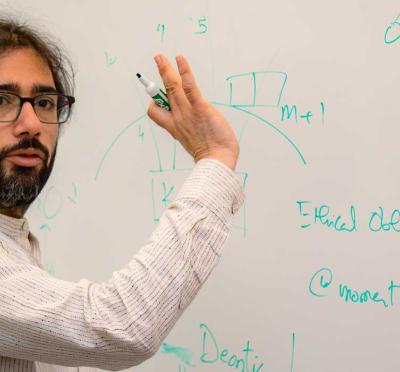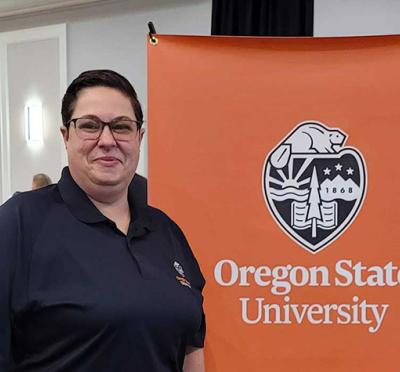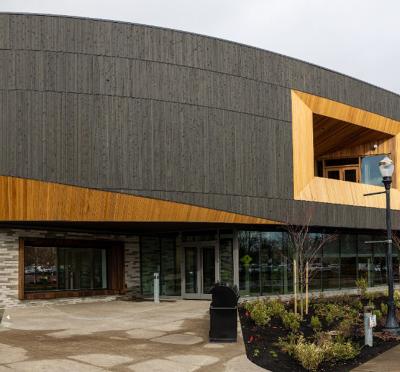Earn a degree that’s built for the future
Join the technical force shaping the future by studying computer science. As a computer science student at Oregon State, you'll learn to use algorithms to develop software and design solutions to real-world problems.
Choose between two concentrations: an applied curriculum that lets you customize your academic pathway based on your interests and career goals or a systems curriculum that focuses on developing software and preparing you for an advanced computer science degree.
Our faculty are leaders in cutting-edge fields like cybersecurity, bioinformatics, and artificial intelligence, and you'll have the opportunity to work on exciting research projects that make a real impact. Plus, with a strong demand for Oregon State computer science graduates, you'll have your pick of diverse and rewarding career paths after you graduate.
Research experience in robotics led Breanne Oo, ’23, to focus on human-centered design. She found a lot of opportunities to build community through student clubs and other activities on campus.
Tamarsh Abeysekera, ’23, finished his degree online while continuing to work. In addition to learning to code, the program helped him develop interpersonal skills.

Undergraduate Information
- Data Structures
- Web Development
- Software Engineering
- Operating Systems
- Analysis of Algorithms
Applied Option (Corvallis campus, Ecampus, OSU Cascades)
The Applied option allows students to develop a degree program that focuses on their area of interest. Students can shape a program that includes fields outside computer science such as music, chemistry, mathematics and medical fields, or specialize in an area of computer science such as artificial intelligence, bioinformatics, game and simulation development, human-computer interaction, and computer security. Students pick 32 credits of electives to develop a cohesive focus area and shape their degree to their particular interest or needs.
Computer Systems Option (Corvallis campus)
The Computer Systems option is for students who want to take up computer science as a career and seek an in-depth understanding of computer science as an academic discipline. This option provides excellent preparation for those who plan to work for companies developing systems software or embedded systems.
Cybersecurity Option (Corvallis, Ecampus)
The Cybersecurity option allows students to gain foundational knowledge and skills in computer science with an in-depth focus on cybersecurity, allowing them to apply those concepts toward securing cyberspace. Students in the program will have the opportunity to further their skills through relevant courses and experiential learning, preparing them for a career in a variety of professions in cybersecurity and related disciplines.
- Online postbaccalaureate computer science degree (B.S.): This program is designed for students who want to earn their computer science degree online and who already have a bachelor’s degree in a different academic discipline.
- Online computer science degree (B.S.): This program is for students who do not already have a bachelor's degree and want to earn a computer science wholly online, on campus, or a mixture of both.
- Undergraduate certificate in cybersecurity: This certificate is for any student currently pursuing a bachelor's degree at Oregon State (including students in the postbaccalaureate computer science program), or anyone who already has a bachelor’s degree from an accredited institution.
- Online computer science minor: This minor provides a wealth of knowledge and skills that are in high demand in virtually every industry, from business and education to agricultural sciences and health care.
- App Development Club
- Artificial Intelligence Club
- Association of Computing Machinery Women's Chapter
- Girls' Empowerment, Engineering, and Outreach
- Hackathon Club
- Security Club, Oregon State University
Have a question about a club? Ask the Engineering Student Council.

“Being a leader for ACM-W has been one of my most impactful experiences at Oregon State. It’s where I’ve been able to exercise project management skills and people management skills as well, and come together as a team with the other officers and strive toward one goal.” – Anjali Vasisht, computer science
Read about Anjali’s experience at Oregon State.
Meet Computer Science Student Breanne Oo
Breanne Oo’s focus in computer science shifted to user experience during a research internship in Heather Knight’s CHARISMA Robotics Lab. Breanne worked on the user interface for ChairBots, a platform for exploring human-robot interactions in common social environments, like conferences and events. Relevant research topics include expressive motion, multirobot control, and navigation in crowds. Brett Stoddard, robotics graduate student, was Breanne’s mentor on the project.
Alerting students toward better grades
Two Oregon State University students are winning entrepreneurship awards as part of the team developing Alerty, a mobile app to help students — especially those with ADHD — perform better in class.
Student envisions AI for safer skies, takes home prize
Air travel can be made safer with artificial intelligence guarding against human error. That’s the vision of Andrew Dassonville, an engineering senior at Oregon State University, who recently took second place in a national airport design competition.
Security Club caps off winning year with strong entry in global competition
Students involved in the Oregon State University Security Club have won or placed near the top in several computer security competitions over the past year, most recently qualifying for DEF CON 30 CTF. Oregon State’s team ranked 15th out of 469 teams around the globe in preliminaries for the capture the flag-style information security competition.
Distance learning, remote working bring a new mom’s tech dreams closer
An online search led Ravonne Byrd to Oregon State’s postbaccalaureate computer science online degree program, which turned out to be the perfect fit for her.
Graduate Information
Degrees offered in Computer Science
- Master of Science (M.S.)
- Master of Engineering (MEng) - coursework only
- Doctor of Philosophy (Ph.D.)
A final oral exam is required for all degrees. The M.S. degree is normally completed in 2-3 years of full-time study or in four years for part-time study. M.S. students intending to continue for a Ph.D. are encouraged to pursue the thesis option.
Ph.D. degrees are typically completed within four years subsequent to the completion of the M.S. degree. Students admitted into the Ph.D. program must pass a qualifying exam and must demonstrate a capability to undertake independent research in order to advance to candidacy as a full Ph.D. student.
All online courses are developed and taught by Oregon State instructors, many of whom are working experts in the computer science industry. Not only will you benefit by learning from experienced professionals, but you’ll also have a robust support system from faculty, staff and a worldwide network of classmates.
A computer science minor can add additional technical skills to a graduate degree. The flexibility of requirements allow students to tailor the interests to the skills they feel are necessary and complementary to their current graduate degree.
Application Deadlines for Fall 2026 start
- Start: Fall 2026
- Ph.D. application deadline: December 10, 2025
- M.S. application deadline: January 1, 2026
Applications are not reviewed until after the application deadlines.
All applicants are considered for School of EECS and university scholarships, fellowships, or assistantships.
Applicants will be notified of admission decisions by mid-March.
If accepted by the School of EECS, the Graduate School will notify the applicant of additional documentation needed for full admission, such as official transcripts, test scores, or financial documentation.
Need additional information? Contact eecs.gradinfo@oregonstate.edu.
Note: The following requirements are in addition to those listed in the Graduate School's application pages.
In order for your application to be complete, the following information must be submitted in the online application:
- Fee: as determined by the Graduate School. The School of EECS does not provide application fee waivers.
- Recommendation Letters: You must provide the names and email addresses of three professional references as part of the online application. The references will be emailed instructions on how to submit their letters.
- Three letters of professional reference are required from former professors or employers familiar with the applicant's technical ability. Particularly valuable are letters that assess the applicant's preparation and ability to complete a research project. Applicants with a master's degree should include the major professor as one reference. Letters must be submitted electronically as part of the online application.
- Statement of Objectives: Please upload as a PDF to your online application.
- Applicants must include a description of their objectives in pursuing an advanced degree. This should be a brief (one page) summary of the applicant's career goals, research interests, and pertinent experience. This information is submitted as part of the OSU online application.
- Resume/CV: Please upload a current copy as a PDF to your online application.
- Academic History: You must enter the information of your current university/degree/major (if attending) and any past university/degree/major.
- Prior Degree: Applicants must have or complete a baccalaureate degree from an accredited college or university before the start of the term. International students must have completed the equivalent of a four-year US baccalaureate degree.
- Unofficial Transcripts: Applicants must upload unofficial copies of transcripts. Web printouts and kiosk copies are not accepted. Current and former Oregon State University students are not required to provide OSU transcripts.
- Grade Point Average (GPA): You must self-report your overall GPA. The School of EECS requires a minimum “B” average (3.00 GPA on a 4.00 scale) on the last two years of undergraduate work and any work completed thereafter.
- Effective July 1, 2008 for Fall 2009 admission or later, if the student has completed his or her baccalaureate degree in a country that is a signatory of the Bologna Declaration, then
- A baccalaureate degree of at least three years duration with a B average (equivalent 3.00 on a U.S. 4.00 grading scale) in the last two years, plus all subsequent graded course work;
OR - A baccalaureate degree of at least three years duration with a two-year (equivalent to 45-quarter credits) graduate degree.
- A baccalaureate degree of at least three years duration with a B average (equivalent 3.00 on a U.S. 4.00 grading scale) in the last two years, plus all subsequent graded course work;
- Effective July 1, 2008 for Fall 2009 admission or later, if the student has completed his or her baccalaureate degree in a country that is a signatory of the Bologna Declaration, then
- GRE: The GRE is not required for admission to the Computer Science M.S. or Ph.D. program.
- TOEFL/IELTS: Please refer to the language requirements required by the Graduate School.
All documents must be in PDF format and under 10 MB in size.
Official documentation information can be found on the Graduate School’s website.
MEng applications are accepted throughout the year with the following deadlines:
- Start: Spring 2025
Application deadline: March 3, 2025 - Start: Fall 2025
Application deadline: August 15, 2025 - Start: Winter 2026
Application deadline: December 9, 2025
U.S. MEng students
International MEng students
The following requirements are in addition to those listed in the Graduate School's application pages.
In order for your application to be complete, the following information must be submitted in the online application:
- Fee: As determined by the Graduate School. The School of EECS does not provide application fee waivers.
- Academic History: You must enter the information of your current university/degree/major (if attending) and any past university/degree/major.
- Prior Degree: Applicants must have or complete a baccalaureate degree from an accredited college or university before the start of the term. International students must have completed the equivalent of a four-year American baccalaureate degree.
- Unofficial Transcripts: Applicants must upload unofficial copies of transcripts. Web printouts and kiosk copies are not accepted. Current and former Oregon State University students are not required to provide OSU transcripts.
- Grade Point Average (GPA): You must self-report your overall GPA. The School of EECS requires a minimum “B” average (3.00 GPA on a 4.00 scale) on the last two years of undergraduate work and any work completed thereafter.
- Effective July 1, 2008 for Fall 2009 admission or later, if the student has completed his or her baccalaureate degree in a country that is a signatory of the Bologna Declaration, then
- A baccalaureate degree of at least three years duration with a B average (equivalent 3.00 on a U.S. 4.00 grading scale) in the last two years, plus all subsequent graded course work;
OR - A baccalaureate degree of at least three years duration with a two-year (equivalent to 45-quarter credits) graduate degree.
- A baccalaureate degree of at least three years duration with a B average (equivalent 3.00 on a U.S. 4.00 grading scale) in the last two years, plus all subsequent graded course work;
- Effective July 1, 2008 for Fall 2009 admission or later, if the student has completed his or her baccalaureate degree in a country that is a signatory of the Bologna Declaration, then
- Grade Requirements for Computer Science Applicants:
- 2.0 GPA in one year of college-level math
- Complete three of the courses below with a grade equivalent to a 3.0 or better in each individual course:
- Undergraduate Courses:
- Algorithm Design and Analysis
- Computer Architecture
- Operating Systems
- Automata Theory/Theory of Computation
- Programming Language Fundamentals
- Compilers/Translators
- Graduate Courses:
- Algorithms
- Computer Architecture
- Programming Languages
- Software Engineering
- Human-Computer Interaction
- Artificial Intelligence
- Undergraduate Courses:
Optional Materials: (a) recommendation letters, (b) statement of objectives, (c) resume/CV (d) GRE scores. These materials will be reviewed but are not required for application or admission
All documents must be in PDF format and under 10 MB in size. Official documentation information can be found on the Graduate School’s website.
The Accelerated Master’s Platform (AMP) allows students to apply and be pre-accepted into graduate program. AMP students can utilize up to 22 graduate level credits between both undergraduate and graduate degree. This is great opportunity for EECS undergraduates considering applying to a graduate program in Computer Science, Electrical Engineering, or Artificial Intelligence. Learn more about AMP here:
Students are encouraged to develop programs of study in close cooperation with the faculty members in their areas of interest.
The School of Electrical Engineering and Computer Science offers four-year financial packages to highly qualified Ph.D. applicants in all specialty areas through our Outstanding Scholars Program, allowing students to focus on research starting in their first year. EECS is committed to ensuring all full-time Ph.D. students are funded through internal or external sources.
“At first I was a little bit sad that I missed out on an undergraduate computer science experience. But as I got up to speed and I didn’t feel behind my peers, I realized that it’s totally an asset coming from a different background like I do.” – Amy Glen, doctoral student, computer science. Read about Amy’s experience at Oregon State.
Grace Diehl is a doctoral student in robotics and computer science. She is part of the Human-Machine Teaming Laboratory, where she works on distributed artificial intelligence for swarm robotics and multirobot systems. Grace is advised by Julie A. Adams, the College of Engineering Dean's Professor of computer science.
Curiosity leads to computer science master’s degree program
Once thinking he’d never study at a university, Daniel de Leon is now a master’s student in computer science at OSU and a GEM Fellow with a stack of internships under his belt.
Addressing global challenges, advancing the Oregon economy
Harnessing one of the nation’s most powerful supercomputers, Oregon State University faculty and students will solve the world’s greatest challenges. The $200 million complex — including a $50 million gift to the OSU Foundation from NVIDIA founder and CEO Jensen Huang and his spouse, Lori — will increase OSU’s support for the semiconductor and technology industry in Oregon and beyond when it opens in 2025. The Huangs are OSU College of Engineering graduates.
OSU among 7 universities to receive FAA drone research, education and training grants
Researchers, led by Rakesh Bobba, have received ~$600,000 from the FAA to address UAS cybersecurity oversight and risk management as it pertains to the National Airspace System and other FAA systems.
OFFSET Swarms Take Flight in Final Field Experiment
Julie A. Adams and two doctoral students have participated in field experiments for the OFFensive Swarm-Enabled Tactics (OFFSET) program at the Cassidy Combined Arms Collective Training Facility in Fort Campbell, Tennessee, with objectives of increasing complexity and difficulty, such as coordinating hundreds of robots for missions in urban areas.
Promoting diversity in open-source software communities
Oregon State University associate professor of computer science Anita Sarma has been named one of 21 international recipients of the Google-sponsored Award for Innovative Research (AIR) in 2021. Debuting last year, the AIR Program aims to foster academic research in computing and technology that advocates for the needs of historically marginalized groups around the world.
This program provides scholarship packages for up to three years of support for cybersecurity undergraduate and graduate education. In return for their scholarships, recipients must agree to work after graduation for the U.S. government, in a position related to cybersecurity, for a period equal to the length of the scholarship.
Job Market Outlook
Make an informed decision to help meet your career goals by using this real-time job market information.
Accreditation
The Bachelor of Science and Honors Bachelor of Science degree programs in the Computer Science Computer Systems Option are accredited by the Computing Accreditation Commission of ABET, http://www.abet.org.
Programs in Computer Science, Information Systems option; Computer Science, Applied Computer Science option are not accredited.
Educational Mission Statement
Our undergraduate educational mission is to provide a comprehensive, state-of-the-art education that prepares our students to be successful in engineering practice, advanced studies and research.
Program Educational Objectives
Bachelor of Science (BS) and Honors Bachelor of Science (HBS) degrees in Computer Science (Computer Systems Option only) are accredited by the Computing Accreditation Commission (CAC) of ABET, http://www.abet.org.
In accordance with accreditation criteria, we have defined a set of Program Educational Objectives, which are “broad statements that describe what graduates are expected to attain within a few years of graduation.” These are based on the needs of the program’s constituencies. They were developed and approved by the EECS faculty and our Industry Advisory Committee (includes employers and alumni).
The Computer Science undergraduate program has the following Program Educational Objectives:
- Graduates of the program will have successful careers.
- Graduates of the program will continue to learn and adapt to a changing world.
- Graduates of the program will practice ethical and inclusive principles that foster collaborative environments.
CS Student Outcomes
The CSO of the CS program has the following Student Outcomes that correspond to the five recommended EAC-wide Student Outcomes and one program specific Student Outcome. These Student Outcomes describe the knowledge and capabilities expected of each graduate. Each Student Outcome addresses one or more of the Program Educational Objectives described above.
Graduates of the program will have an ability to:
- Analyze a complex computing problem and to apply principles of computing and other relevant disciplines to identify solutions.
- Design, implement, and evaluate a computing-based solution to meet a given set of computing requirements in the context of the program’s discipline.
- Communicate effectively in a variety of professional contexts.
- Recognize professional responsibilities and make informed judgments in computing practice based on legal and ethical principles.
- Function effectively as a member or leader of a team engaged in activities appropriate to the program’s discipline.
- Apply computer science theory and software development fundamentals to produce computing-based solutions. [CS]
The Mapping Between Old Student Outcomes a-k and New Student Outcomes 1-6
Prior to AY2019-2020, ABET Student Outcomes were defined as a-k, thus the CSO of the CS program relied on these Student Outcomes. However, starting AY2019-2020, the old Student Outcomes a-k have been remapped to the new Student Outcomes 1-6. The following table shows the mapping between the old and the new Student Outcomes.
| Student Outcomes a-k | Student Outcomes 1-6 (Applicable beginning of the 2019-2020 cycle) |
|---|---|
| (b) An ability to analyze a problem, and identify and define the computing requirements appropriate to its solution. | 1. Analyze a complex computing problem and to apply principles of computing and other relevant disciplines to identify solutions. |
| (c) An ability to design, implement, and evaluate a computer-based system, process, component, or program to meet desired needs. | 2. Design, implement, and evaluate a computing-based solution to meet a given set of computing requirements in the context of the program’s discipline. |
| (f) An ability to communicate effectively with a range of audiences. | 3. Communicate effectively in a variety of professional contexts. |
| (e) An understanding of professional, ethical, legal, security and social issues and responsibilities. | 4. Recognize professional responsibilities and make informed judgments in computing practice based on legal and ethical principles. |
| (d) An ability to function effectively on teams to accomplish a common goal. | 5. Function effectively as a member or leader of a team engaged in activities appropriate to the program’s discipline. |
| (j) An ability to apply mathematical foundations, algorithmic principles, and computer science theory in the modeling and design of computer-based systems in a way that demonstrates comprehension of the tradeoffs involved in design choices. | 6. [CS] Apply computer science theory and software development fundamentals to produce computing-based solutions. |
| (a) An ability to apply knowledge of computing and mathematics appropriate to the program’s student outcomes and to the discipline. | |
| (g) An ability to analyze the local and global impact of computing on individuals, organizations and society. | |
| (h) Recognition of the need for and an ability to engage in continuing professional development. | |
| (i) An ability to use current techniques, skills, and tools necessary for computing practice. | |
| (k) An ability to apply design and development principles in the construction of software systems of varying complexity. |


